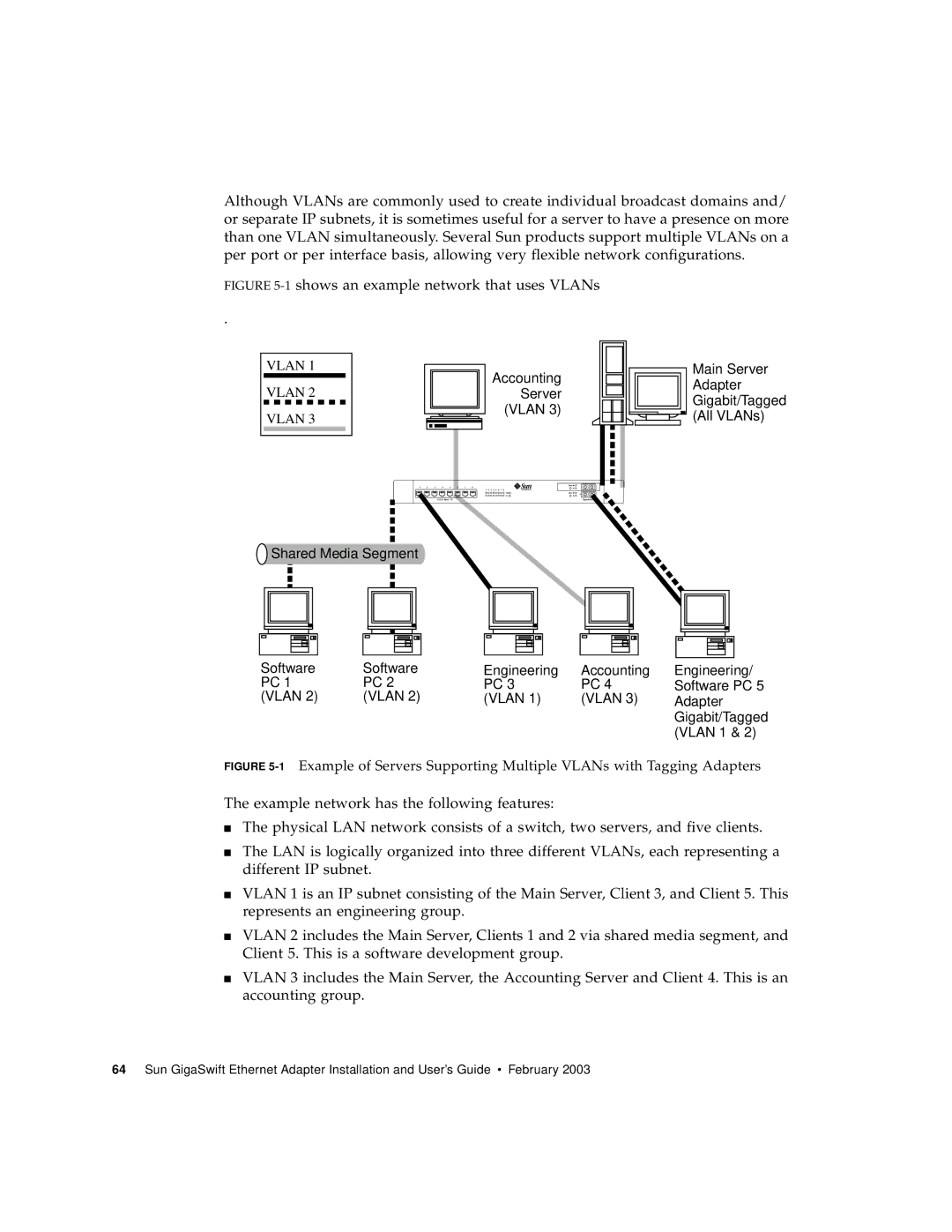Sun GigaSwift Ethernet Adapter Installation User’s Guide
Please Recycle
Regulatory Compliance Statements
FCC Class a Notice
ICES-003 Class a Notice Avis NMB-003, Classe a
Bsmi Class a Notice
Page
Declaration of Conformity
European Union
Page
Declaration of Conformity
Page
Contents
Network Configuration
Configuring Driver Parameters
Configuring VLANs
Specifications
Diagnostic Software and Troubleshooting Issues
Index
Page
Figures
Page
Tables
Performance Sepcifications
Preface
How This Book Is Organized
Using Unix Commands
Typographic Conventions
Shell Prompts
Accessing Sun Documentation Online
Related Documentation
Sun Welcomes Your Comments
Product Overview
Hardware Overview
Link is in Full Duplex mode
Sun GigaSwift Ethernet MMF Adapter
LED Displays
1Front Panel Display LEDs for the MMF Adapter
Sun GigaSwift Ethernet UTP Adapter
2Sun GigaSwift Ethernet UTP Adapter
2Front Panel Display LEDs for the UTP Adapter
Hardware and Software Requirements
Patch Requirements
Product Features
Key Protocols and Interfaces
Diagnostic Support
Page
Installing the Driver Software
Become superuser
1Files and Directories on the CD-ROM
Select the packages you want to install
Menu similar to the following displays
Patch version should be -07 or greater
Verifying Patches
# showrev -p grep
Patch version should be -13 or greater
Patch version should be -05 or greater
To Install the Adapter
Installing the Adapter Without Dynamic Reconfiguration
Save the filler panel screw for Step
1Connecting the Fiber Optic Cable
To Verify the Installation
2Cat-5 Twisted-Pair Cable
Ok show-nets
List the network devices on your system
Ok cd /pci@1f,0/pci@1/network@4
View the.properties file for a list of device properties
Ok .properties
Phy-typewill have its value assigned as follows
Setting the local-mac-addressProperty
Ok setenv local-mac-address? true
Ok setenv boot-device /pci@1f,2000/pci@1/network@4
Rebooting the System
Ok boot -r
Installing the Adapter With Dynamic Reconfiguration
To Install an Adapter in a Dynamic Reconfiguration System
States and conditions should be
# cfgadm
# cfgadm -c disconnect sysctrl#slot#
# cfgadm -v -c configure sysctrl#slot#
# cfgadm -c disconnect sysctrl03
Configure the adapter and slot
Reconfigure the devices on the adapter
# drvconfig devlinks disks ports tapes
Connect the adapter and slot
Page
Configuring the Network Host Files
Use the ifconfig command to setup the adapter’s ce interface
# ifconfig ce0 plumb ipaddress up
# cat /etc/hosts
To Set Up a GigaSwift Ethernet Port on a Diskless Client
Export/root/clientname
Edit the hosts in the diskless client’s root directory
Network Configuration
Find the root directory of the client system
# grep clientname /etc/bootparams
# cd /cdrom/cdrom0/GigaSwiftEthernet/Packages # ls SUNWce
Shut down and halt the client system
Use the shutdown command to display the OpenBoot ok prompt
# shutdown -i0 -g0 -y
Ok boot /pci@1f,4000/network@4speed=100,duplex=full
Proceed with the Solaris operating environment installation
# pkginfo grep SUNWce
Booting Over the GigaSwift Ethernet Network
Ok boot device-pathspeed=s,duplex=d,link-clock=c,promiscuous
1Device Link Parameters
2link-clockCapabilities for Link Up
# boot netspeed=1000,duplex=full,link-clock=master
# boot netspeed=100,duplex=full
# boot netspeed=1000,duplex=auto,link-clock=auto
Page
Configuring Driver Parameters
GigaSwift Ethernet Device Driver Parameters
Driver Parameter Values and Definitions
1ce Driver Parameter, Status, and Descriptions
Operational Mode Parameters
Operational Mode Parameters
2Operational Mode Parameters
Flow Control Parameters
3provides flow control keywords and describes their function
3Read-Write Flow Control Keyword Descriptions
Gigabit Link Clock Mastership Controls
4Forced Mode Parameter
Interpacket Gap Parameters
5Parameters Defining enable-ipg0and ipg0
7describes the receive interrupt blanking values
Interrupt Parameters
7RX Blanking Register for Alias Read
Random Early Drop Parameters
8RX Random Early Detecting 8-Bit Vectors
PCI Bus Interface Parameters
9PCI Bus Interface Parameters
Setting ce Driver Parameters
Setting Parameters Using the ndd Utility
To Specify Device Instances for the ndd Utility
Use the instance number to select the device
Device remains selected until you change the selection
# ndd -set /dev/ce instance instance#
To modify a parameter value, use the -setoption
Ndd utility then prompts you for the name of the parameter
# ndd -set /dev/ce parameter value
# ndd /dev/ce parameter
Setting the Autonegotiation Mode
Set the adv-autoneg-capparameter to
Setting Parameters Using the ce.conf File
# ndd -set /dev/ce adv-autoneg-cap
Second line in the previous example
To Set Driver Parameters Using a ce.conf File
# grep ce /etc/pathtoinst
Usability Enhancements to the Driver
Third line in the previous example
Save the ce.conf file
# ndd -set /dev/hme instance
GigaSwift Ethernet Driver Operating Statistics
Then you had to get the link status
# ndd -get /dev/hme link-status
# kstat cen grep linkup
10Read-Only ce Device Capabilities
11describes the read-only link partner capabilities
Reporting the Link Partner Capabilities
11Read-Only Link Partner Capabilities
12describes the netstat -k transmit and receive parameters
12Transmit and Receive Parameters
12Transmit and Receive Parameters
# netstat -k ce0
Code Example 4-1Output from kstat Command
# kstat Ce0
# kstat ce0
# kstat ce0
Use the kstat command to discover link partner capabilities
# kstat ce0 grep lp
Use the kstat command to discover link settings
# kstat ce0 grep link
Page
Configuring VLANs
An Overview of VLANs
1shows an example network that uses VLANs
Configuring VLANs
To Configure Static VLANs
Vlan logical PPA = 1000 * VID + Device PPA
# ifconfig ce123000 plumb up # ifconfig ce224000 plumb up
# ifconfig -a
Page
Connectors
Table A-1SC Connector Link Characteristics Ieee P802.3z
Table A-2Cat-5 Connector Link Characteristics
Performance Specifications
Table A-3Performance Sepcifications
Power Requirements
Physical Characteristics
Table A-5Power Requirements
Page
Diagnostic Software Troubleshooting Issues
SunVTS Diagnostic Software
Using the OpenBoot Prom FCode Self- Test
Running the Ethernet FCode Self-Test Diagnostic
Reset the system
Shut down the system
Type show-netsto display the list of devices
Ok setenv diag-switch? false
Ok test /pci@1f,0/pci@1/network@4
Troubleshooting Issues
Set the auto-boot?configuration parameter to true
Reset and reboot the system
Ok setenv auto-boot? true
Type the following to apply and save your changes
Adv-pause-cap
Non-Specific Issues
Failure to Configure GigaSwift Ethernet Instance
Table B-1Troubleshooting the GigaSwift Ethernet Adapter
Problem with DR Attach on Sun Enterprise Platforms
Reboot system
Add the following lines to the /etc/system file
Set drdetachsafelist1=ce set hswpsuspendsafelist1=ce
Page
Symbols
Index

![]() Shared Media Segment
Shared Media Segment